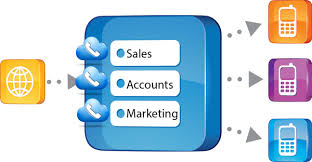Business Phones and Mobile Networks
The use of the Internet for business phones is quite accepted and common. It is slowly gaining acceptance across all businesses. Though pioneered by large companies that saw an immediate cut in expenditures, small and medium businesses have now latched on and are using it to increase their business. Business phones are going to a face a huge competition in terms of Internet of Things.
Internet of Things (IoT) is a system where the computing devices are interrelated with unique identifiers. Data can be transferred through them without the requirement of human to computer or human to human interaction. The end device in an IoT network can be a farm animal that has a biochip installed in it, a person with an implanted heart monitor, or even an automobile that has built in sensors in it. The thing will become a ‘thing’ in IoT when an IP address is assigned to it.
As IoT gains usage, there will be innovative ideas for providing services to different spheres of businesses in addition to business phones. The commercial models, that are emerging from IoT promise to make exponential growth in the mobile network. There will be innovation in efficiency of networks, service delivery, and other factors.
IoT will change the system in the sense that mobile phones will not primarily be used for communication. As the use cases will be varied, they will pose a challenge to the networks to make their system more efficient, agile and automated.
Starting Point
With IoT in full operation, this world will be better connected and networks have to decide their role in it. Obviously their operating framework and position in the market will be the key players. The carriers will need to focus on the network developers, service enablers and service creators.
The main focus will be on the core connectivity of the system where service level of the networks must be managed efficiently. The service enablers will create such platforms on which new services can be created. And, of course, the responsibility of the service creators will be to control the entire connectivity and the system. Mobile networks will be the core point in all these.
Networks Evolution & Business Phones
As already mentioned, just like mobile business phones are cases for broadband, there will be numerous cases for IoT. Obviously cellular will be an attractive operating base for it, as cellular is licensed spectrum in contrast to LPWAN that is an unlicensed spectrum.
To support these change it is necessary that developments are sought after in Mobile networks too. Nobody knows which case will be chosen by which industry for their communication when IoT becomes prevalent in almost every industry. The main focus of cellular technology has been on human to machine consumption. With IoT use cases, this will change and it will require fresh performance in terms of everything – cost, security, capacity, latency, reliability, uptime, etc.
Presently in the US, assuming every human being is a using a cellular device, we have some 320 million mobile connections. Add some 250 more of existing IoT devices. These numbers will pale into oblivion when some billion or more devices get connected in the next few years. Image ten or more devices for every human being, and we are talking in the range of 3-4 billion devices being connected. At least half of these will be connected through mobile networks.
With time, there will be multiple layers of technology. The challenge that has to be met by the networks is to meet this technological advancement
The Networks Evolution
Presently, the networks are evolving from GSM to LTE. The gap between them is covered by 3GPP – REL 1. With EC-GSM, it will be possible to support cases that have deep indoor coverage and also long battery life. These will be typically useful in smart buildings, smart meters and agricultural sector where small amount of data will be transferred to the network. For dealing with bigger amount of data there will be LTE-M.
With IoT, the mobile network providers are also keen to develop their system and be a part of this revolution. By 2020 5G spectrum will be there to support all these devices that will be operating on IoT technology.
About PhoneAM
At Phone America, we have the knowledge and experience to prepare a blueprint for your shift to VoIP. Call us today and we will guide you through the whole process.
Phone America Corporation is a leading supplier of advanced telecom systems for small and large businesses. We serve as a single point of contact for today’s growing communication needs, offering a wide range of telephone equipment, wiring, surveillance systems, telephone cost accounting systems, and voice processing systems.
Call (800) 836-3601 for a free evaluation of your current system and the system you will need to carry your business into the FUTURE.

